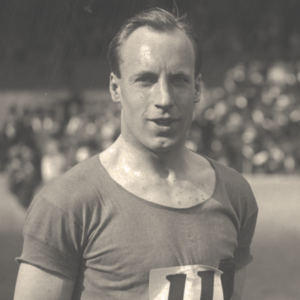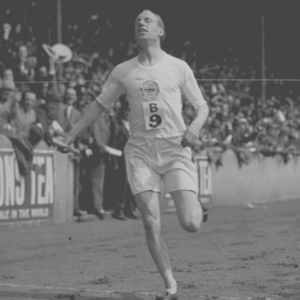Eric Liddell – the life of an athletics legend
Written by Colin Shields and edited by Arnold Black
 The son of a family of Scottish congregationalist missionaries, Eric Liddell was born in the North China city of Tientsin in January 1902.
The son of a family of Scottish congregationalist missionaries, Eric Liddell was born in the North China city of Tientsin in January 1902.
His father had been a draper before becoming a missionary in the 1890s and travelled to China on behalf of the London Missionary Society.
In 1907, with his parents returning home on leave, Liddell was five years old when he set foot in Scotland for the first time. The following year Eric and his older brother Robert went to Eltham College in London, a school for the sons of missionaries, where he stayed for the next 12 years.
Eric entered Edinburgh University in the autumn of 1920 to study for a B.Sc. Degree in pure science over four years.
Within a few months he had been recruited to the University Athletic Club by fellow students, though at only 5 foot 9 and a shade over 11 stone in weight he hardly possessed the build of a budding champion athlete.
In 1921, he made a startling and successful debut at the SAAA National Championships at Glasgow’s Hampden Park. There he recorded the first of his five National sprint double wins between 1921 and 1925.
 Liddell was a charismatic athlete with a distinctive, if ungainly style, running with his head back and arms flailing, clearly giving every ounce of effort he could summon.
Liddell was a charismatic athlete with a distinctive, if ungainly style, running with his head back and arms flailing, clearly giving every ounce of effort he could summon.
Spectators loved him for his infectious enthusiasm and many attended sports meetings purely to see him run.
Liddell was one of that rare breed of men who were talented enough to gain honours when representing their country at international level in two different sports – in his case, athletics and rugby.
He represented Scotland in seven international rugby matches in just 18 months, scoring four tries.
His gospel activities were very important to him and he preached at various venues in Central Scotland as crowds heard him detail his simple faith.
In July 1923, competing for the first time in the prestigious AAA Championships at London’s Stamford Bridge, the 100 yards final saw the Scot trailing after a less than perfect start. But he duly burst past his rivals in the final stages of the race to win in 9.7, a new British record.
Liddell completed an outstanding afternoon’s competition when winning the 220 final in 21.6 and received the Harvey Memorial Cup as the outstanding champion of the year.
When the organising committee of the eighth Games of the modern Olympics at Paris agreed, at a meeting in January 1924, that the heats of the 100m sprint would be held on the first Sunday of the Games, it seemed to the committee members an innocuous decision.
However, it had momentous repercussions for Liddell. As a committed Christian who regarded Sunday as the Lord’s Day and not one on which to compete, Liddell decided not to race in the 100, his best event.
Instead, he switched the emphasis of his Olympic challenge that summer to the 400m, at which he was virtually inexperienced at international level, and concentrate his efforts on winning Olympic gold at an event over which he had never broken 49 seconds. The result of this decision was to make Liddell world famous.
For he not only won the event at Colombes Stadium in Paris in the face of the strongest possible opposition but broke the World and Olympic records with a style and panache that amazed the spectators at the track and the running world in general.
Liddell had the satisfaction of not only staying firm to his strongly held faith but of triumphing physically over the world’s best at 400m at the highest level of competition and establishing a legend that is remembered with awe and affection 100 years later.
Before the 400m event, Liddell won the bronze medal in the 200m in 21.9 seconds. In the 400 final, Liddell was drawn in the sixth and outside of the string lined lanes, and though the least experienced was certainly the fastest sprinter in the field.
Whether lifted by the Bible or the pipe band music, Liddell ran like a man inspired. Utilising all his sprinter’s speed, he covered the first 200m of the one bend race in the startling and unofficial time of 22.2. He was three metres clear of his nearest rival as they entered the finishing straight with the American Fitch, closing slightly.
With 50m to go, Liddell summoned up all his strength and stamina and, with his head back, staring at the sky, knees pumping and arms flailing wildly, he increased his lead over the fading Fitch for a winning margin of five yards at the tape to finish in 47.6 seconds.
Liddell’s time was accepted as World, Olympic, European, Empire and British records. The IAAF accepted the time as a World record until a review in 1928 saw the 1916 run of 47.4 by Ted Meredith (USA), also run on a one bend course but without stringed lanes, for the longer distance of 440 yards being retrospectively accepted as a performance superior to Liddell’s time.
During the following winter, Liddell prepared for his intended life’s work of teaching and preaching as a missionary in China.
His final season of competitive athletics in 1925 was brief but extremely successful. He recorded a winning sprint treble at the Scottish Championships.
Within weeks of his final race this truly remarkable man left Edinburgh and followed in his father’s footsteps by going to China as a missionary. At the mission at Tientsin in Northern China, he taught Chemistry and English at the Anglo-Chinese College and encouraged the Chinese students in their sporting activities.
Liddell married with Florence Mackenzie, the daughter of a Canadian missionary, in 1934. The couple had three daughters, but when China descended into chaos with the Japanese invasion, Liddell sent his family to safety in Canada as he remained in China.
He switched to rather more evangelical work in the North China plain. There, he suffered privation and hardship as an itinerant missionary, smuggling money hidden in loaves of bread for church work; riding his bike by night tending victims in a typhoid outbreak; and saving a church member, at the risk of his own life, from execution by the Japanese.
In 1943, with 1800 Europeans, he was imprisoned in a Japanese internment camp at Weihsien. He was to die there of a brain tumour on 21 February 1945 aged only 43.
His reputation and fame have transcended time, proving an example to many aspiring Scottish athletes. The Scottish Schools AA award the Eric Liddell Memorial Trophy each year to the athlete achieving the most meritorious performance.
Paris 100m gold medallist Harold Abrahams paid tribute to him.
‘Eric’s name will forever remain as perhaps the most famous and most respected and loved athlete Scotland has ever produced,’ said Abrahams.
‘His style was about as unorthodox as it could be, but the main thing is that he always displayed the greatest courage, and he will be remembered as one of the finest sportsmen who ever donned a running shoe.
‘Eric was a man whose internal spiritual convictions contributed largely to his athletics triumphs. While his ability must have been great, his profound intensity of spirit must have been the vital spur to allow him to achieve so much.’
Latest Articles
International

Latest Facebook update
Problem displaying Facebook posts. Backup cache in use.
Click to show error